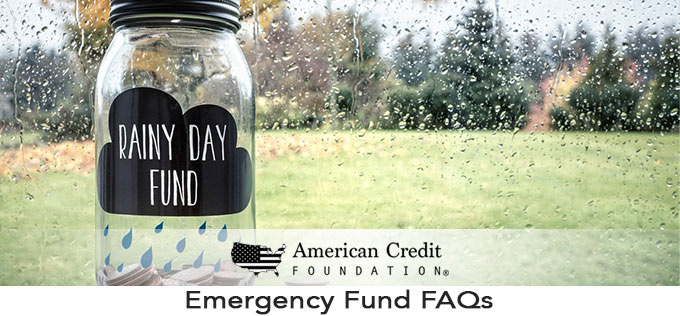Emergency Fund FAQs

If you’re reading this article, you either a.) have an emergency fund and want to check if you’re “doing it right,” b.) intend to set one up and need advice, or c.) never heard of an emergency fund and got scared that you’re missing out. (FOMO, anyone?)
For your sake, we hope you fall into the first category – that you’ve already embraced the notion of having an emergency fund to prevent racking up debt to pay for unexpected expenses. But if you’re a B or C, we’re glad you’re here! There’s no time like the present to take important actions regarding a special kind of savings account that can help protect your financial future.
Q. What is an “emergency fund?”
A: Just as the name implies, your emergency fund is a stockpile of cash you set aside to cover the costs of a true emergency. (Think: Major car repair. ER visit. Mortgage payments if you lose your job.) Of course, your definition of “emergency” will be unique, but be honest – don’t dip into the fund to pay for a new wardrobe or a European cruise.
Q: How much should be in my emergency fund?
A: You can choose any amount, but a general rule of thumb is to amass at least three to six months’ worth of expenses set aside for emergencies. First, you need to determine your monthly expenses – the ones you absolutely can’t not pay – and then multiply that by three or six, depending on your goal. (If you figure $2,000 in monthly expenses, for example, your emergency fund should contain $6,000 – $12,000.)
Obviously, this number will be different for everyone and is not a hard-and-fast amount. (Some financial experts recommend having enough to cover you for 12 months.) If you’re just starting out, try setting a goal of $1,000 to cover small emergencies that may pop up.
Q: Where should I stash my emergency fund?
A: It’s best to keep your emergency fund separate from your other accounts – just to remove any temptation to sneak those funds to cover your daily living expenses. Set up a savings account that accrues interest. To make transfers easy, look into an account at your current bank, credit union, or other financial institution.
Because you want to make sure you have the cash available at a moment’s notice in the event of an emergency, DON’T place your savings in:
- A certificate of deposit (CD) with an early withdrawal penalty if you take money out before the CD matures
- An annuity with a surrender period
- An account in which your funds aren’t guaranteed, such as mutual funds, stocks, and bonds
Q: What if I don’t have “extra cash” just lying around?
A: Don’t get scared off by the savings goals. You don’t need to reach your goal in one fell swoop. Start small – even just $10 or $25 deposits will begin to add up over time if you stick with it. And remember, any amount you save will help avoid the need to go into debt to pay off a catastrophe.

Q: How can I boost my emergency fund?
A: The easiest (and least painful) way is to set up auto-payments. Then your savings will begin to add up without a second thought. If you earn a paycheck that gets direct-deposited, arrange to post a portion of each payday into your emergency account. If not, you can still set up an automatic transfer every month from your main day-to-day account – you’ll just need to make sure your regular account has the funds. In addition, you should train yourself to transfer larger amounts whenever you come into more cash, such as when you receive a holiday bonus or an unexpected tax refund.
It’s inevitable: Life WILL throw a wrench into your well-oiled machinery once in a while. But if you’re armed with an emergency fund, you can rest assured that you have a backup plan. Still have questions about how to go about setting one up? Need more pointers on boosting yours? Contact American Credit Foundation today. One of our trusted professional financial counselors is happy to provide expert advice.

